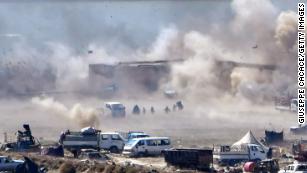(CNN)ISIS has suffered a momentous blow with the defeat of its last physical stronghold, according to an announcement Saturday by the US-backed Syrian Democratic Forces.
Updated 1:01 PM ET, Sun March 24, 2019
Peter Bergen is CNN's national security analyst, a vice president at New America and a professor of practice at Arizona State University. He is the author of "United States of Jihad: Investigating America's Homegrown Terrorists." View more opinion articles at CNN.
(CNN)ISIS has suffered a momentous blow with the defeat of its last physical stronghold, according to an announcement Saturday by the US-backed Syrian Democratic Forces.

At the height of its power four years ago, ISIS controlled an area in Iraq and Syria that was the size of Portugal and lorded over almost 8 million people -- a population larger than that of Bulgaria. ISIS also ran a quasi-state that taxed and extorted its millions of subjects, enabling it to field a terrorist army with a large war chest.
While ISIS once attracted an estimated 40,000 people around the world to join its so-called caliphate, that number has since plummeted, as it seems no one wants to join the losing team.
While Trump, who took a premature victory lap last month, certainly contributed to ISIS' demise, the conditions are still ripe for similarly dangerous terrorist groups to form and multiply.
The Trump administration did make a substantial shift in the fight against ISIS in Syria by arming Kurdish forces and increasing the US military presence there.
But it was the Obama administration that initiated the operation in 2016 to take back Mosul, the second largest city in Iraq, where ISIS first declared its "caliphate." Under Obama, ISIS also lost key Iraqi cities including Fallujah, Ramadi and Tikrit.
The Obama administration, however, was so concerned about "mission creep" in Syria that it capped the number of US troops there to 500.
Bergen: No, Trump didn't defeat ISIS
In the waning months of Obama's second term, his Cabinet debated whether to arm Syrian Kurds, who would be key to taking back cities like Raqqa -- which served as ISIS's headquarters. But the US would risk angering Turkey, which considers the Syrian Kurds to be closely aligned with a terrorist group in Turkey.
The Obama team debated this option for so long that it eventually ran out of time to implement it. When it finally approached the incoming administration with the plan to do so, former national security adviser Michael Flynn reportedly rejected it on the grounds that the Trump team wanted to conduct its own assessment of the situation.
After Trump entered office, he approved a plan to arm the Kurdish forces in Syria and dramatically increased the number of US troops there from 500 to 2,000. He also gave his ground commanders greater authority to take military action against ISIS without consulting with the White House.
Days before Raqqa was liberated from ISIS in October 2017, President Donald Trump lauded himself in an interview and said, "I totally changed rules of engagement. I totally changed our military, I totally changed the attitudes of the military...." He also claimed ISIS hadn't been defeated earlier because "you didn't have Trump as your president."

Trump can certainly take credit for hastening the demise of ISIS, but ultimately, the US' strategy was remarkably similar under both presidents. Instead of relying heavily on large numbers of US troops, both presidents used US Special Forces to train and advise local forces. The ground fight against ISIS was almost entirely conducted by Iraqi and Syrian soldiers.
Trump tends to define any course of action that he takes as being markedly different from Obama, but in the case of the anti-ISIS campaign, there were more similarities than differences between the two presidents.
ISIS has lost its physical territory in Iraq and Syria, and is significantly weaker without a base from which it can train thousands of militants. But it is likely to continue to inspire attacks around the world as a virtual caliphate.
And the real problem is that the conditions in the Middle East that gave rise to ISIS still exist and are likely to produce similar jihadist groups. Those problems include deep sectarianism, fragile or failed governments, and weak economies. Throw in the fast-growing population of the Middle East, and you have a toxic mix that will continue to produce the kind of anger upon which groups such as ISIS feed.
We should be ready for an offshoot of ISIS to form in places like Afghanistan, Libya, Yemen, or any other weak state in the region. It may not grow to be as powerful or widespread as ISIS, but the truth remains that there will be a successor group.
It would be dangerous for Trump to celebrate the fall of ISIS without keeping this in mind. To do so would be to commit the same mistake that President Obama made in January 2014, when he dismissed the group that would soon morph into ISIS as a "junior varsity" team.

